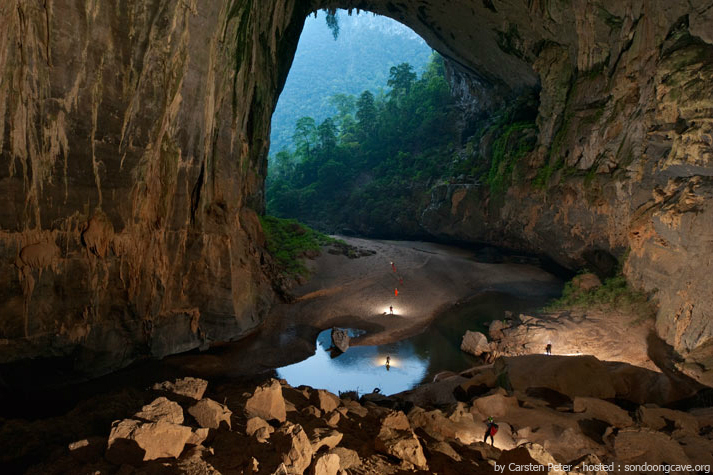|

“The Thien Duong tour,” she recalls, “started from the city of Dong Hoi very early in the morning, and we travelled 60km through the green landscape of vast rubber tree forests and limestone mountains spotted with grazing cows.”
The cave is inside the World Heritage-listed Phong Nha-Ke Bang National Park, home of the mythic Son River. Legend has it that the river was where a young couple decided to drown themselves rather than live separately. The name Son, or “Vermilion”, commemorates the couple’s faithfulness.
It is accessible to visitors who have to climb up 524 steps bordered by liana vines resembling giant serpents.
Hidden charm
The cave mouth has been formed by two fossilised tree trunks which once evoked the attention of the Vatican’s Saint Peter Chancel.
"It felt like the unfolding of a new sky," says Khanh Van, a visitor from Hanoi.
The ceiling resembles a gothic arch 80–100m high, while the floor points towards icons of Oriental culture.
"Some stalagmites remind us of Buddha, the Great Wall of China, and a Tay Nguyen (Central Highlands) rông house," she says.
Each part of the cave opens into a different space, with giant naturally formed silhouettes of unicorns, lions, and dragons. In some places the waves of its sandstone appear like a desert. Its interpretative openness symbolises the reconciliation of various religions embraced throughout Vietnam’s long history.
The Cave was discovered by local man Ho Khanh in 2005. British Cave Research Association (BCRA) representatives explored and named it Paradise. They listed it as “the longest dry cave in Asia” (100m high, more than 200m wide, and large enough to hold 1,000 people), which might be formed 300-400 million years ago.
No wonder visitors find the Paradise Cave more beautiful and mystic than Phong Nha Cave recognized as a World Heritage Site by UNESCO.
Truong Thinh Corporation has initially invested VND83 billion (US$4.3 billion) in opening the first kilometre of the cave’s 31.4lm length to tourists.
"The next 6km demands a more adventurous spirit" says Huyen.
World Natural Heritage
Quang Binh’s famous caves have lured increasingly large numbers of both domestic and international tourists.
The Phong Nha-Ke Bang National Park was recognised by UNESCO as a World Natural Heritage Site in 2003. It covers 85,754ha of forests, tropical jungles, rivers, grasslands, and subterranean cave systems.
The Park’s Deputy Director Dang Dong Ha says 22 international exploratory expeditions have been undertaken since 1990, along with a BCRA survey conducted by Howard Limbert.
The Phong Nha-Ke Bang has become a "kingdom of caves" famous in Vietnam, Asia, and the rest of the world. Explorers have uncovered 170 caves with a total length in the hundreds of kilometres.
Phong Nha cave’s underground river is the longest (7.7km), and Son Doong cave, the largest in the world.
|